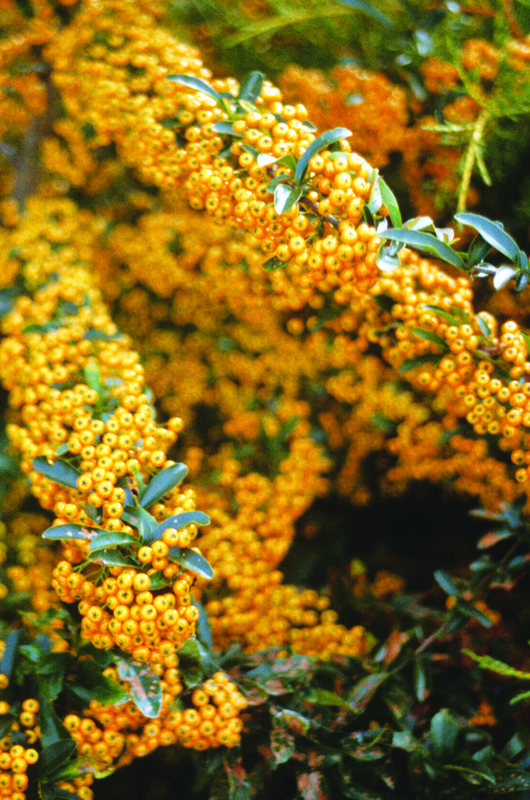| General Description | A broad leafed evergreen with thorns all over the branches . Grows to about 2.5-3.5 m tall. Large clusters of small white flowers form in May and produce a almighty display of scarlet coloured berries in the autumn that persist into winter. |
| ID Characteristic | 'Lalandei' is a broad leafed evergreen shrub with white showy flowers in spring that produce an abundance of reddish-orange berries in autumn. Berries persist into the winter months. Thorns are present throughout layered branching. Heights range from 2.5-3.5 m. |
| Shape | Erect or upright in shape with spreading branches, very dense form. |
| Propagation | Take semi-ripe cuttings in mid or late summer. Pot as soon as roots form and harden off before planting outside. |
| Cultivation | Pyracantha thrives in sunny, dry locations but can tolerate some shade. A loamy soil of 5.5 pH is best for growing conditions. Once established, Firethorn can endure heat and drought stress fairly well but needs shelter from wind. Container growth should be introduced outdoors in April. |
| Pests | Fireblight is a problematic issue to Firethorn. Beware of apple scab, it can ruin berry formation and turn them a sooty brown. Lace bug, scales, aphids, root rot and spider mites are some of the less serious pests. |
| Notable Specimens | Oakes Gardens, Niagra Parks Commissions, Niagra Fall, Ontario, Canada. |
| Habitat | Horticulture origin |
| Bark/Stem Description | Woolly looking new growth becoming shiny brown bark with spines 1-2 cm long. |
| Flower/Leaf Bud Description | Small buds form rounded spheres, approximately .5 mm and covered in brown scales. |
| Leaf Description | Leafs are 2-4 cm long and 0.5-1 cm wide on long shoots and 1.5-3.5 cm long and average width on flowering shoots. Dark glossy green in colour and slightly pubescent on the underside. Simple, alternate, cuneate and acute with a 2 cm long petiole. |
| Flower Description | Small, white showy flowers that form on spurwood from last years growth, in large clusters along all branches throughout May. Perfect flowers can become approximately 2.5-5 cm in diameter and 5-8 cm long. |
| Fruit Description | Clusters of orange-red berries cover the Firethorn in a spectacular visual display. Berries are 0.5-0.7 cm in diameter and round in shape. Berries can be made into delicious jams or incorporated into other recipes. |
| Colour Description | When well protected from winds, glossy dark green leaves can persist all winter but may also become brown in colour if not planted in a sheltered area. |
| Texture Description | Medium |
